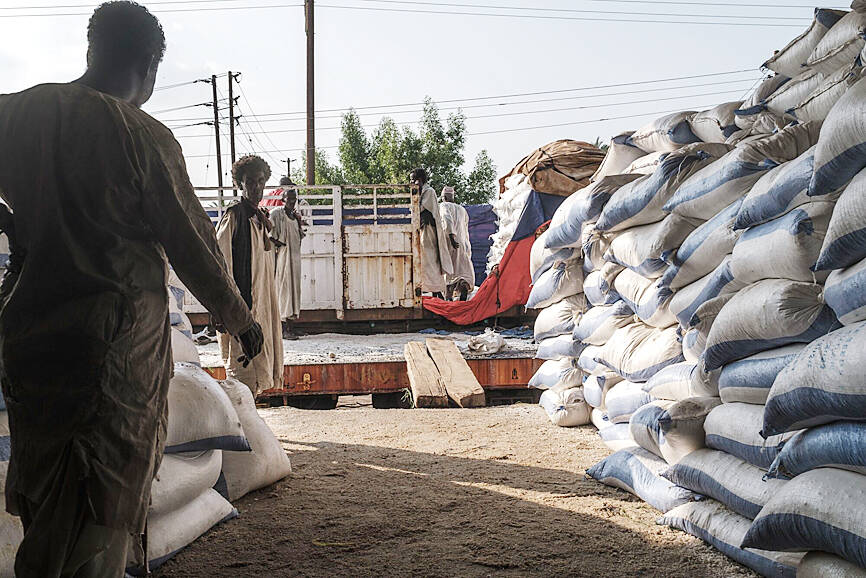The Sudanese government has suspended its participation in the global hunger-monitoring system on the eve of a report that is expected to show famine spreading across the country.
In a letter dated Monday, the Sudanese minister of agriculture said the government is halting its participation in the Integrated Food Security Phase Classification (IPC) system.
The letter accused the IPC of “issuing unreliable reports that undermine Sudan’s sovereignty and dignity.”

Photo: Bloomberg
The IPC was expected to publish a report yesterday finding that famine has spread to five areas in Sudan and could expand to 10 by May, a briefing document showed.
“This marks an unprecedented deepening and widening of the food and nutrition crisis, driven by the devastating conflict and poor humanitarian access,” the document said.
A spokesperson for the Rome-based IPC declined to comment.
Sudan’s withdrawal from the IPC system could undermine humanitarian efforts to help millions of Sudanese facing extreme hunger, said the leader of a non-governmental organization (NGO) operating there, speaking on condition of anonymity.
“Withdrawal from the IPC system won’t change the reality of hunger on the ground, but it does deprive the international community of its compass to navigate Sudan’s hunger crisis,” the NGO source said.
“Without independent analysis, we’re flying blind into this storm of food insecurity,” the source added.
A diplomat with Sudan’s mission to the UN in New York did not immediately respond to a request for comment on the move to cut off the IPC.
The IPC is funded by Western nations and overseen by 19 large humanitarian organizations and intergovernmental institutions, but it has struggled to function in Sudan since civil war erupted there in April last year.
The fighting between the army-backed government and the Rapid Support Forces (RSF) paramilitary has disrupted data collection in areas held by both sides.
The forthcoming IPC report lacks updated malnutrition data and assessments of crop productivity during the recent summer rainy season, it says.
The growing season was successful, Monday’s letter says.
It also notes “serious concerns” about the IPC’s ability to collect data from territories controlled by the RSF.
Alex de Waal, executive director of the World Peace Foundation at Tufts University’s Fletcher School, called Sudan’s move to stop cooperating with the IPC “both pathetic and tragic.”
“It’s part of a long history of the government of Sudan denying famine going back more than 40 years,” said De Waal, a leading specialist on famine.
“Whenever there’s a famine in Sudan, they consider it an affront to their sovereignty, and they’re more concerned about their pride and their control than they are over the lives of their citizens,” he added.

Kehinde Sanni spends his days smoothing out dents and repainting scratched bumpers in a modest autobody shop in Lagos. He has never left Nigeria, yet he speaks glowingly of Burkina Faso military leader Ibrahim Traore. “Nigeria needs someone like Ibrahim Traore of Burkina Faso. He is doing well for his country,” Sanni said. His admiration is shaped by a steady stream of viral videos, memes and social media posts — many misleading or outright false — portraying Traore as a fearless reformer who defied Western powers and reclaimed his country’s dignity. The Burkinabe strongman swept into power following a coup in September 2022

‘FRAGMENTING’: British politics have for a long time been dominated by the Labor Party and the Tories, but polls suggest that Reform now poses a significant challenge Hard-right upstarts Reform UK snatched a parliamentary seat from British Prime Minister Keir Starmer’s Labor Party yesterday in local elections that dealt a blow to the UK’s two establishment parties. Reform, led by anti-immigrant firebrand Nigel Farage, won the by-election in Runcorn and Helsby in northwest England by just six votes, as it picked up gains in other localities, including one mayoralty. The group’s strong showing continues momentum it built up at last year’s general election and appears to confirm a trend that the UK is entering an era of multi-party politics. “For the movement, for the party it’s a very, very big

ENTERTAINMENT: Rio officials have a history of organizing massive concerts on Copacabana Beach, with Madonna’s show drawing about 1.6 million fans last year Lady Gaga on Saturday night gave a free concert in front of 2 million fans who poured onto Copacabana Beach in Rio de Janeiro for the biggest show of her career. “Tonight, we’re making history... Thank you for making history with me,” Lady Gaga told a screaming crowd. The Mother Monster, as she is known, started the show at about 10:10pm local time with her 2011 song Bloody Mary. Cries of joy rose from the tightly packed fans who sang and danced shoulder-to-shoulder on the vast stretch of sand. Concert organizers said 2.1 million people attended the show. Lady Gaga

SUPPORT: The Australian prime minister promised to back Kyiv against Russia’s invasion, saying: ‘That’s my government’s position. It was yesterday. It still is’ Left-leaning Australian Prime Minister Anthony Albanese yesterday basked in his landslide election win, promising a “disciplined, orderly” government to confront cost-of-living pain and tariff turmoil. People clapped as the 62-year-old and his fiancee, Jodie Haydon, who visited his old inner Sydney haunt, Cafe Italia, surrounded by a crowd of jostling photographers and journalists. Albanese’s Labor Party is on course to win at least 83 seats in the 150-member parliament, partial results showed. Opposition leader Peter Dutton’s conservative Liberal-National coalition had just 38 seats, and other parties 12. Another 17 seats were still in doubt. “We will be a disciplined, orderly